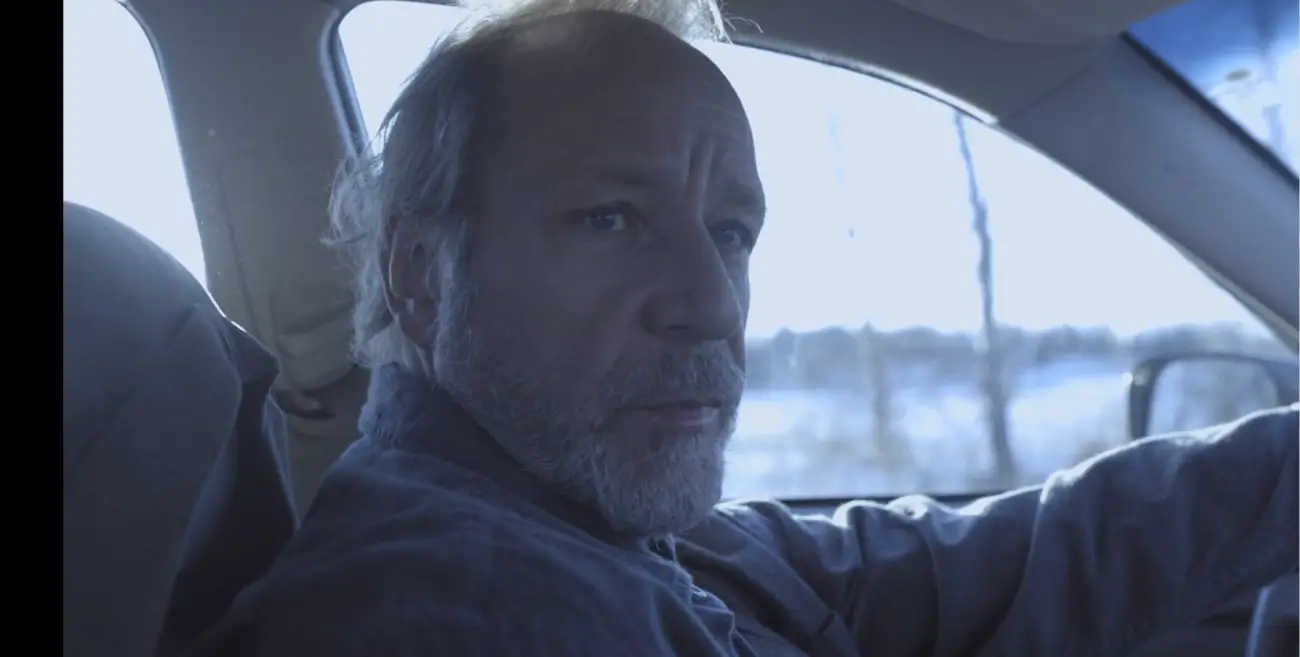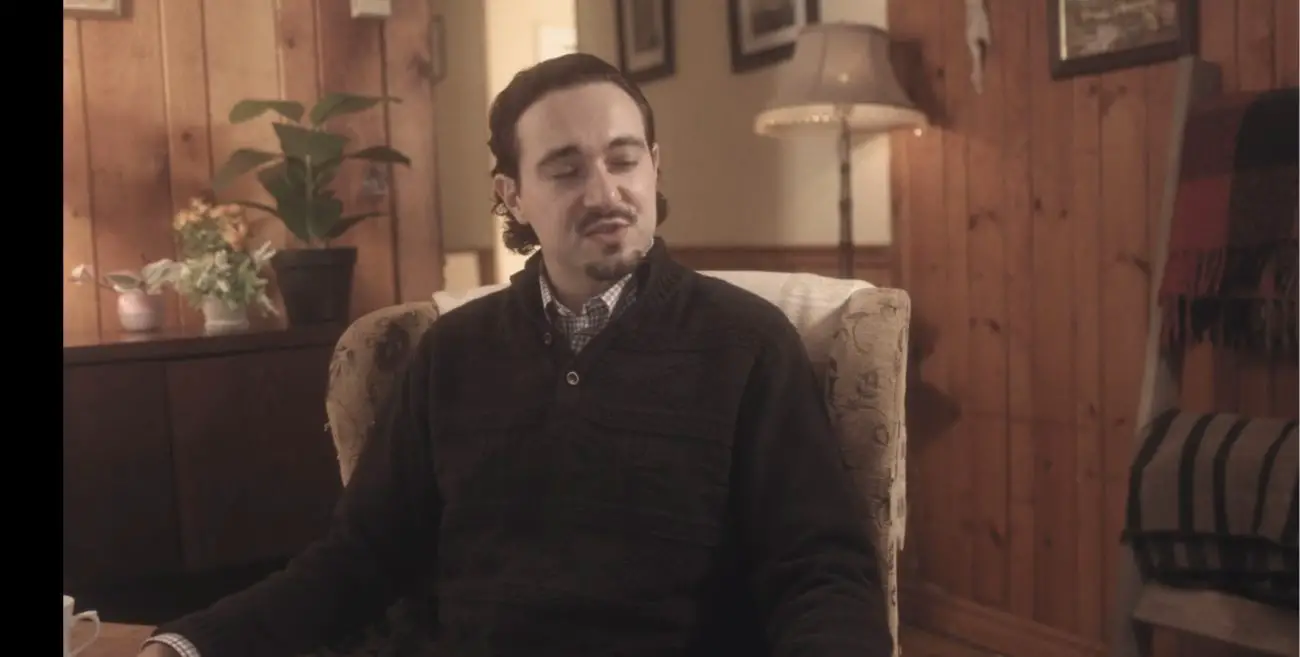‘Panties, panties, panties..’
So says Monette in Mute: he’s enjoying the telling of a tale. Perhaps a little too much, because this is not just any tale: this is a confession.
Mute is a 23 minute film based on Stephen King’s short story, a story which spoke to director Kyle Dunbar. His intention wasn’t to mess too much with the original, ‘being a devout fan I wanted to make one of his stories and render it justice with the right cast’ he says. And he has done something which some other Stephen King adaptations overlook, he’s kept the feeling of fun running right through.
http://chicartpublicrelations.cmail20.com/t/i-l-cjuutn-jdtykkujdh-h/
That humour jars with the subject matter, but it’s absolutely right. King lulls you into the telling, it seems like a small town tall tale, but it quickly becomes something more.
Monette is a travelling book salesman with a picture book marriage. He’s away a lot. But he has no reason to worry. Except his wife suddenly tells him of an affair. Not an ‘it was a mistake’ affair. This one was so established at the motel that ‘they had set up housekeeping’, Monette recounts. And then the detail comes, the lingerie she bought for him, the way she funded the lifestyle. He goes into detail. He isn’t embarrassed. But that’s OK. The person he’s telling is a hitchhiker he’s picked up and who just happens to be a deaf mute. Having unburdened himself, that’s it. Job done, eh? Oh no, there’s more to it than that. One of those things is that he’s telling a priest. This is confession.
That confessional aspect to the story is important because Mute plays with the nature of the story. Tales change, depending where they’re told, the way they are recounted, the fruitiness of the telling. The more outré details may be extended perhaps for friends in a bar. For friends of your parents at their home, things may be different.

So this is a recouting to the holy man. But as Andrew Santella said in The Slate a few years ago, confession was becoming sparser, perhaps because of the wish to confess outside of the church. And there is another Mute film from 2011 which is a shorter short and which places the confession in the church. The decision to move it to the comfy living room opens things up for more possibilities. He wrote “…secular culture is increasingly awash in confession, apology, and acts of contrition of every sort. Parents own up to pedophilia on Jerry Springer. Authors reveal their fetishes and infidelities in self-lacerating memoirs.’ And this short film messes with the continuum of confession. The priest is earnest. But the confession doesn’t take place in the church, Monette is in his house.
How does he know him? Why does he get special testament? These are all delicious questions. He hasn’t made an appointment, it seems, as the priest remarks he has people visiting soon. So he’s just dropped by. And was accepted into the Father’s house. Unusual. They discuss whether confession in a living room is within the ‘rules’. It is. But it makes things a little off kilter, as if the result isn’t quite correct. Particularly as Monette has to rush because visitors are due.
Does this lessen the story? Or make it more in the telling? You decide. As Colleen Hoover said, ‘It’s not a confession if no one reads it. It’s just an unshared secret’. Does it need the ritual? Mute has fun with these levels. What has Monette done? Why does he feel the need to confess? Is this a confession? Or is he just enjoying the act?
Mainly this is Andrew Bee as Monette, telling his story. He pitches it perfectly. The thing moves from relish to outrage and Bee really enjoys the script here. Dunbar has adapted King’s story with the easygoing downhome feel to the storytelling left in. But he’s done something else: he’s left the playfulness, the enjoyment of words, the humour in there. This adds warmth and lots to play with.
Bee, who we’ll know from Suicide Squad, really enjoys himself here without going too far and not being able to pull it back. The three words that start this piece? It looks for all the world when he performs them as if he’s attempting to embarrass the priest. But there’s a worldweary quality which makes us feel that he’s told this tale before and a pride in himself which gives the story somewhere to move. His relish at the language is so well done and so warm and naughty that we may almost feel guilty for enjoying it with him.

That holyman is played by Christian Tribuzio with delicacy too. He has a concerned piety which you could almost feel is feigned. And a little prissy, his slight annoyance at having to hear confession when he is expecting visitors is trumped only by his school teacher feel when dispensing the Hail Marys and Our Fathers.
A young priest, the feeling is that he’s a little inexperienced and that Monette has either chosen him or has been spurred on by his demeanour. The title character of Mute? Alexandre Stoupenkov doesn’t have much to do as the hitchhiker. But he manages to convey the feeling, with his reactions to Monette’s attempts at communication, that he is not entirely happy to receive it. Unable to speak or hear, he doesn’t concern himself with ingratiating, rather he carries a hostility which is entirely appropriate for the later plot. Dunbar allows his actors to tell the story, to have time to work with their characters, to interpret. That takes strength; letting go of the directorial reins allows this story to breathe. As Bee said; ‘Monette has so much dialogue and the challenge for me was to kind of let it go wherever it was going.’
A word on cinematographer Roman Lapshin, who manages to work with mostly 2 locations to produce a sense of menace in the car and a sense of security in the living room. Dunbar uses the shadows in the vehicle and the hitchhiker out of frame to suggest uneasy possibilities whilst the openness of the house stand in sweet contrast. There’s a lightness of touch here, the story unfolds and yet is slightly heightened. When the cuts from the car to the cleric happen, there’s air around them, as if the priest is engrossed and wants to say ‘and?…’ but feels he needs to observe ritualistic niceties. That this direction seems simple might well be the hardest thing to do.
As with any Stephen King project, the big question is: is this a horror? It is. I won’t reveal the outcome but the implications will surely make you wonder. Like all good stories, we don’t have it on the screen, this concern, questioning, unease takes place in the mind. There is a gentleness here in the telling and a feeling of fun.




Thank you, Steve, for this wonderful review.